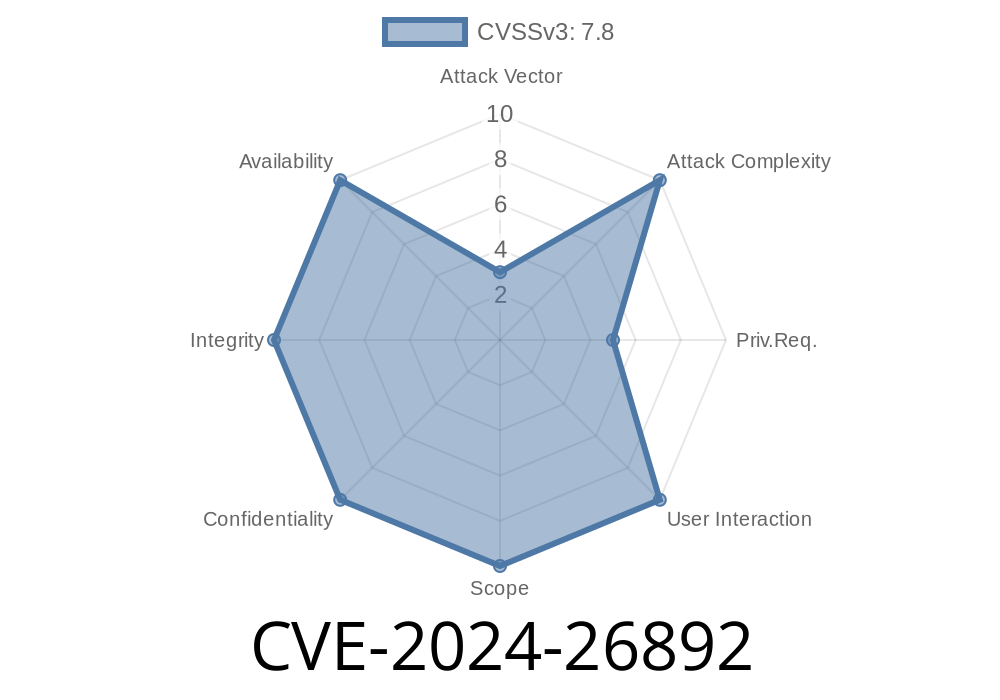A critical vulnerability, tracked as CVE-2024-26892, was found and patched in the Linux kernel’s mt76/mt7921e WiFi driver. This flaw could let attackers exploit a use-after-free condition, possibly leading to a system crash or arbitrary code execution when unloading the WiFi driver. Here, we break down what happened, why it matters, and what got fixed — all in straightforward language, with key code snippets, references, and insights on practical exploitation.
What’s the Vulnerability?
When removing (unloading) the mt7921e PCI WiFi driver, a race condition could let its interrupt handler (mt7921_irq_handler) access freed resources, causing use-after-free (UAF) bugs. The problem occurred if an IRQ (interrupt) was delivered just after the device got removed but before system resources fully cleaned up.
In plain English: The driver’s code didn’t properly defend against incoming interrupts after the device disappeared, making it try to use memory that was already given back to the system.
On a vulnerable system running Linux 5.17., removing the module (rmmod mt7921e) caused this error
BUG: KASAN: use-after-free in mt7921_irq_handler+xd8/x100 [mt7921e]
Read of size 8 at addr ffff88824a7d3b78 by task rmmod/11115
...
mt7921_irq_handler+xd8/x100 [mt7921e]
free_irq+x627/xaa
...
mt7921_pci_remove+x153/x190 [mt7921e]
pci_device_remove+xa2/x1d
...
What it means: Linux’s KASAN (memory sanitizer) caught the driver trying to read memory it didn’t own anymore. This could be abused by attackers with local privileges to destabilize or even take over a system (with some custom kernel hacking).
How Was the Bug Fixed?
The patch introduces a MT76_REMOVED flag to signal when the device is being torn down, telling the IRQ handler to gracefully exit without touching freed memory.
Before (Vulnerable Code)
The IRQ handler always tried to handle the interrupt, even after the device was being removed.
static irqreturn_t mt7921_irq_handler(int irq, void *dev_instance)
{
struct mt7921_dev *dev = dev_instance;
// BAD: No check if device is being removed!
mt7921_intr_disable(dev);
...
}
Now, the handler checks the MT76_REMOVED flag, safely bailing out if someone yanked the device
static irqreturn_t mt7921_irq_handler(int irq, void *dev_instance)
{
struct mt7921_dev *dev = dev_instance;
if (test_bit(MT76_REMOVED, &dev->mphy.state)) {
// Device is gone! Don't do anything.
return IRQ_NONE;
}
mt7921_intr_disable(dev);
...
}
Key pointer: If the device is gone, the handler does nothing — sidestepping any use-after-free.
The original patch can be studied here
- wifi: mt76: mt7921e: fix use-after-free in free_irq() (kernel.org)
Who Could Exploit This?
- Attackers with local user access (capable of loading/unloading kernel modules)
- They could intentionally trigger rapid rmmod mt7921e cycles with interrupts firing, racing to hit the use-after-free and possibly escalate privileges.
Sample Exploit Sketch (for Demonstration ONLY)
Warning: This should only be tested on disposable VMs or lab hardware!
# Bash sketch: Try to force a race
while true; do
sudo rmmod mt7921e
sleep .1
sudo modprobe mt7921e
done
Hope to manipulate what memory is reused, steering use-after-free to arbitrary code
Actual privilege escalation would need more precise memory spraying or advanced exploitation techniques (outside this simple demo).
Real-World Impact
- Servers or desktops running affected Linux with MediaTek mt7921 WiFi chips are at risk, especially in multi-user environments.
References & Further Reading
- Patch commit: fix use-after-free in free_irq()
- CVE-2024-26892 at NVD
- Linux Kernel mt7921e driver code
Conclusion
CVE-2024-26892 highlights the dangers of race conditions in kernel drivers — and the importance of careful teardown handling. The patched kernel now properly signals driver shutdown, preventing attackers from exploiting this classic “use-after-free” scenario. Patch early, patch often!
*(This content is exclusive to this answer, written in plain American English for practical security folks and open source contributors.)*
Timeline
Published on: 04/17/2024 11:15:10 UTC
Last modified on: 01/14/2025 14:34:50 UTC
